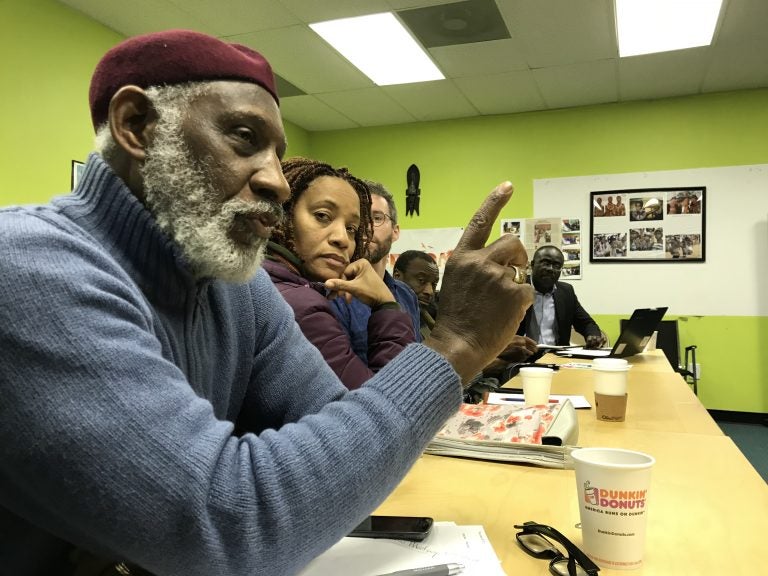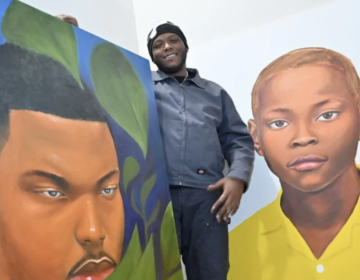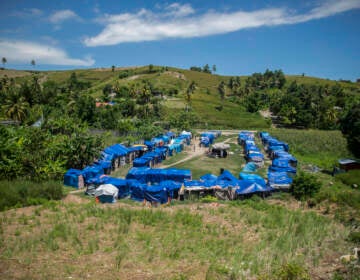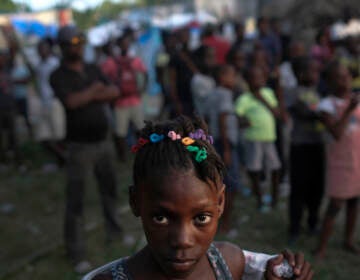‘Disgusted’ African and Caribbean immigrants in Philly respond to Trump’s vulgar comments with action
After President Trump allegedly made vulgar comments about several countries, leaders of Philly's African and Caribbean communities want to turn their outrage into action.

Stanley Straughter, a member of the Mayor's Commission on African and Caribbean Immigrant Affairs, speaks during a strategizing meeting of African and Caribbean community members on January 13, 2018 at Southwest Community Development Corporation in Philadelphia. (Laura Benshoff/WHYY)
“Insulted.”
“Appalled.”
“Disgusted.”
These were some of the words used by about two-dozen representatives from African and Caribbean organizations around the Delaware Valley in response to profane statements reportedly used by President Donald Trump.
“It is horrendous. It is unacceptable. It is also very uncharacteristic of what the United States is,” said Eric Edi, chief operating officer of Africom, a social service and advocacy agency for local African and Caribbean communities in the Philadelphia area.
During a bipartisan meeting on immigration policy last week, President Trump referred to Haiti, El Salvador, and African nations as “shithole countries,” according to Democratic U.S. Sen. Dick Durbin of Illinois and others present at the meeting. The president also questioned why the U.S. would want immigrants from those countries.
On Saturday, members of Africom, the Major’s Commission on African and Caribbean Immigrant Affairs, the Nigerian People’s Forum, the Haitian Coalition of Philadelphia, the African Ministers Association, the Liberian Association of Philadelphia, Councilwoman Jannie Blackwell and representatives from Councilwoman Helen Gym’s office huddled in a windowless conference room in Southwest Philadelphia.
They gathered in search of a response that would show their anger and flex the political muscle of the area’s significant African and Caribbean immigrant populations.
“We are working with an immigrant community that have a greater percentage of people who move to permanent residency and also naturalize. We need to capitalize on that,” said Edi, referring to the large number of lawful immigrants from African and Caribbean countries who arrive through refugee programs or family-sponsorship.
One main topic of the meeting was how to connect this voting population to issues they care about, whether it’s immigration policy or access to city services.
While the immigration debate most frequently zooms in on Latino communities, the Philadelphia region is home to tens of thousands of people from countries in African and the Caribbean. More than 10,000 Liberians and 20,000 Nigerians live in Southeastern Pennsylvania, according to estimates compiled by the Historical Society of Pennsylvania. Just a few blocks away from Saturday’s meeting, trolleys and cars hustled through “Little Monrovia,” a stretch of Woodland Avenue where many Liberians first land when coming to the United States.
In November, an estimated 1,400 Haitians living in Pennsylvania lost their protection from deportation as the Trump administration ended “temporary protected status” for Haitian citizens living in the U.S.
“We have to take a stand,” said Miranda Alexander, who is from Trinidad and Tobago and is a member of the Mayor’s Commission on African and Caribbean Immigrant Affairs. “We deal, as African diaspora people, with racism on so many levels.”
Trump had previously made crude comments about immigrants from Haiti and Nigeria, during a December meeting with his advisors. Nigerians with visas to the U.S. would “never go back to their huts” after seeing this country, he said, according to the New York Times.
“I have no more tears, no more energy to comment on what the president said. We know he’s a racist, we know it’s horrible,” said Steve Paul, who immigrated to the U.S. from Haiti when he was nine-years-old and now works in City Councilwoman Helen Gym’s office.
After two hours of discussion, the group settled on two actions. First, a press conference at Philadelphia City Hall on Tuesday to condemn President Trump’s comments and highlight the presence of black immigrants. Next, they will hold a “day of action,” a combination economic boycott and protest at a later date.
WHYY is your source for fact-based, in-depth journalism and information. As a nonprofit organization, we rely on financial support from readers like you. Please give today.




